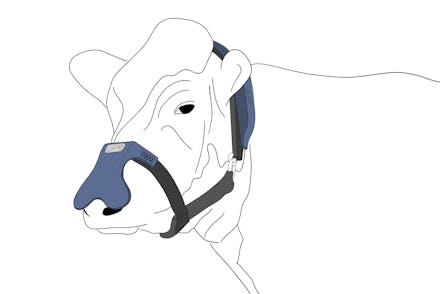New masks designed to catch cow burps could help save the planet

Cow farts, it is often pointed out, contribute to climate change. But while it's true that cows release methane each time they cut the cheese, if you truly want to limit the emissions coming from cow gas, you should be focusing on the other end of the animal. About 95 percent of a cow's contribution to greenhouse gas emissions comes from belches and burps. Now, a UK-based startup called Zelp has a plan to take care of all these cow fumes by placing masks on cattle that can capture their burps and turn them into something a little more innocuous.
According to a report from Bloomberg, Zelp has created a rubber-like plastic mask that can attach to a standard cow halter. When applied, it rests just above a bovine's nostrils and waits for a cow's stomach to start rumbling. When the cow burps, the gas is captured by the mask, which sucks it up through a fan system that is charged by solar-powered batteries. The burp is sucked up through the chamber, where it goes through a chemical reaction process that converts the methane into carbon dioxide. Zelp claims that the process can cut a cow's emissions down by about one-third. Bloomberg reported that those claims have not yet been peer-reviewed, an important process that the product will likely have to undergo before it is viewed as viable by the scientific community — though it reportedly won't stop the company from going to market with its creation.
For the most part, Zelp seems particularly invested in keeping its concept under wraps. The company only has a prototype right now, which it has not allowed the media or the public to see, fearing that someone might steal the company's trade secrets. That prototype is reportedly too big to fit around a cow's neck and cannot complete the methane conversion process unless in a very specific setting. The company is promising a commercial version of the product that will be able to be worn by the animal for life and provide much more flexibility in its use.
While Zelp may still have some kinks to work out and some work to do in order to back up all of its claims, the mask (assuming it works) would present a significant advancement in the fight to combat cow gas. Agriculture is the second-biggest contributor by sector to climate change, trailing only the energy industry. According to the Food and Agriculture Organization of the United Nations, livestock like cows accounts for nearly 15 percent of all greenhouse gas emissions globally. Combatting those emissions is difficult because it largely just has to do with the digestive systems of these animals, which use microbes to break down fibers, producing methane as part of the process. While feeding a grain-based diet instead of a grass one can cut down on some of these emissions by making the microbes not have to work as hard, there is only so much that can be done through diet while maintaining the health of the animals. Humans changing their diet to move away from meat might help by simply reducing the amount of livestock and cattle that must be kept. But the fact remains that cows are gassy creatures and that gas isn't doing the planet any favors. If we can't cut down on the need for cows, then capturing their burps just might be the next-best thing.